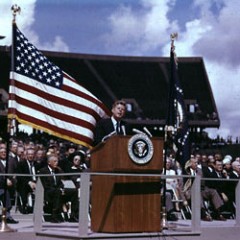
November 22, 2013 is 50 years to the day that then President John F. Kennedy was assassinated in Dallas, Texas. Fifty years is a long time ago, but for the man who lived for just a short 46 years, he did a lot for his country and the world. There has been and will continue to be a lot of remembrances of the 35th President of the United States of America, but I for one am grateful for the path he started us on, in a speech before a Joint Session of Congress on May 25th, 1961 and reiterated in a speech on the campus of Rice University as well.
It was on that day and in that speech where he announced that the United States would undertake the dramatic and ambitious goal of sending an American safely to the Moon and back before the decade was out. He felt great pressure to catch up to and overtake the Soviet Union in the “space race” and that wasn’t the amazing part.
Project Mercury’s first success was to send Alan Shepard on May. 25th 1961, a little more than a year after Kennedy challenged us to reach for the moon. Mercury was a success in that it was a necessary step for the Gemini program, but at that point in the space race the Soviet Union was one step ahead of the United States.
In fact, ignoring the space race itself, the ability to put a manned spacecraft into orbit was the only thing that existed towards going to the moon. All sorts of technologies that eventually led us to footsteps on the moon wasn’t even conceived when Kennedy addressed that Joint Session of Congress.
We were challenged with not only going to the moon, but doing it first, and in doing so, we had to create the technologies that we would need to accomplish this. And it wasn’t merely that it was a tough task to undergo, it was a tough task, made tougher by being behind in the space race and having a goal to set foot on the moon before the decade was over.
Remember again, Alan Shepard was the first American in space and that was just three weeks prior to Kennedy announcing that we were going to the moon. Amazingly it isn’t the speech to congress that everyone remembers, it was a speech on September 12, 1962 at Rice University where he stated,
“We choose to go to the moon. We choose to go to the moon in this decade and do the other things, not because they are easy, but because they are hard, because that goal will serve to organize and measure the best of our energies and skills, because that challenge is one that we are willing to accept, one we are unwilling to postpone, and one which we intend to win, and the others, too.”
A man on the moon in just seven years? No space walks, no space dockings with a lunar module and no lunar module at that. It was an amazing feat of engineering that allowed his vision to come to pass. And even though he was shot six years before Neil Armstrong was the first human to set foot on the moon, he set the wheel in motion. He asked us to reach for the heavens and we did.
There is a lot to be said for the legacy of John F. Kennedy, he did a lot for civil liberties in the United States, and helped the world ease out of at least one crisis in Cuba, but for me, as a child that was fascinated with space flight, it was his words that ignited the United States Space Program. Even though that program is a shadow of it’s former self, the accomplishments of the agency are there for all to see. And it started with him. Who knows what would have been for the space program had he lived? Who knows how much farther we would be? But that is not for us to focus on. What he did, to get us to the moon cannot and must not be understated. It was a dream he had for the nation. And it wasn’t to be a dream differed. It was a dream realized and I’m sure he would have been proud of the accomplishment.
